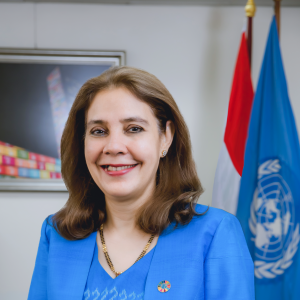Selamat Pagi.
Representatives of the Ministry of Administrative and Bureaucratic Reform,
KOMINFO and MoFA
Academic partners, and
UN colleagues
It is an honour to address you about Indonesia's digital transformation led by the Government, private sector, academia, young people and the UN.
This is a new kind of partnership among stakeholders, with each playing to their comparative strengths in this joint commitment to a digital transformation for a prosperous and inclusive future.
This critical agenda requires all the attention, investments and innovative solutions it deserves.
Today’s deep dive is important for kick-starting the dialogue with a focus on digital skills, digital safety, digital ethics and digital culture.
Underlying these goals are the government’s commitment as set out in the digital economy development framework for 2030.
This framework is an enabler for accelerating the SDGs as it drives growth, bridges the digital divide, and prioritises emerging technologies and AI.
Importantly, Indonesia's digital economy is set to double next year representing over 4% of GDP.
A large share of this growth comes from e-commerce with fintech and digital platforms revolutionizing business operations, especially those used by young people.
With its young, internet-savvy population increasingly reliant on digital services, Indonesia is a rich environment for start-ups.
At the same time, digital connectivity and infrastructure are growing with nearly nine in ten households using the internet.
Further growth will come from connecting rural areas that remain underserved by high-quality access.
The last mile approach led by the government with its smart village and smart island initiative will deliver inclusive, sustainable and equitable digital transformation.
Equally important will be to bridge the digital divide, which remains both geographic and generational, but also persists between genders.
Women make up 56% of graduates in the country, but only a third of them have degrees in technology and only a fifth work in technology-related sectors.
There is a pressing need for far more women to choose careers in STEM and the IT sector. These tools will enable them to open new horizons for themselves and their communities.
This will boost gender equality and accelerate the SDGs, which require a strong basis in science, technology and innovation.
Digital literacy also needs to extend beyond technical and practical abilities, emphasizing foundational skills, especially for younger generations.
This will prove transformative by empowering young people nationwide to harness digital technologies for their own and their communities’ benefit.
The UNESCO-Readiness Assessment Methodology will be an asset in identifying opportunities in infrastructural, educational, and socio-economic investment to bridge the digital gap.
AI, especially, is poised to play an outsized role in accelerating SDG progress.
It has significant impacts on optimizing energy consumption, enhancing medical diagnostics, monitoring biodiversity and broadening access to education, to name a few areas.
AI can also help with inclusion. For instance, Bu Mira, a new online chatbot, assists women in developing SME businesses through financial tools and support for loan applications.
This enables women entrepreneurs to better utilize financial services and accelerate the growth of their businesses.
As this example shows, the private sector will play a crucial role in scaling up AI-driven technologies.
These can benefit both bottom lines and circularity by boosting competitiveness and resource efficiency.
Currently, only around half of CEOs in Indonesia are using generative AI for business operations. However, business leaders widely share the view that AI will help them improve product and service quality.
In tandem with scaling up AI in the private sector, governments will need a robust regulatory framework to mitigate risks.
This is because AI can have its downsides: it displace jobs, threaten data privacy, and intensify bias and discrimination.
The UN Secretary-General has highlighted the need for rules and safety with AI often controlled by opaque algorithms beyond human understanding.
This means that the collaboration with government becomes even more important as the UN connects innovators and policymakers for technical and policy standardization.
I am heartened that Indonesia is taking a lead digital governance to harness the power of AI and other digital technologies.
The government’s national strategy is in line with the UN’s vision to ensure its ethical and inclusive use.
These values also align with Indonesia’s Pancasila philosophy.
We at the UN are proud to be working with Indonesia on its broad-based digital transformation.
This multi-stakeholder partnership today is an excellent example of how we can all join forces to leverage international standards and best practices to take the country’s digitization to new heights.
Learning from lessons in Indonesia, we can then spread good practices to other countries across the global south.
Thank you.




